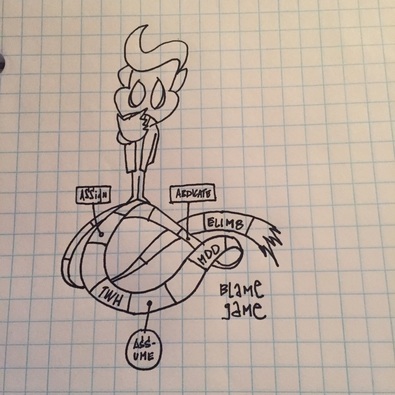 How leaders respond to conflicts can either reinforce cultural values that strengthen the team or they can respond in ways that destroy morale. In organizational cultures everyone loves playing The Blame Game and bosses are particularly fond of the follow up game, Crap Rolls Downhill. Both are games are trademarked but neither has any clearly defined rules or pre-determined outcomes. The game is often initiated by conflict and the fantastical response of leadership to avoid responsibility for resolution. Play number one is to assign. This phase of the game is also so joyously referred to as The Witch Hunt. The dice are shaken, rolled and a conflict of sorts ensues as the numbers clamber upon the playing surface. Whether the inquisition is over employee issues, customer service, payments, product failures or the like, bosses will rally the wagons, feigning a quick and concerned response. As the dust settles on the parade of indignation the supervisory fingers are drawn from their holsters with an insatiable thirst for flesh. Assignment of blame is seen by many as a gold star in the managerial belt. If someone can be blamed then we can all conclude that The Witch Hunt was successful. All that a conflict needs in order to be resolved is for some party to be assigned the blame. Shake the dust from our hands and the sweat from our brows, our job is d-o-n-e. Play number two is to assume. When blame cannot be immediately assumed and The Witch Hunt cannot be satisfied, the participants of the game have to make a choice whether they will draw upon the Actually-Investigate-An-Issue card or select from the much thicker Deck of Assumptions. The scientific process is only for nerds, right? Why would any self-respecting manager, who’s time is worth more than pure San Francisco gold, dip their manicured fingers into the Mire of Dispute Discernment? Most management practitioners believe they have achieved their success by trusting their trustworthy gut, so why would conflict resolution be any different? The savvy boss already knows who is guilty, they don’t need crime scene analysis, jury review or the Supreme Court to tell them what they already assume is correct. Play number three is to abdicate. If the dice aren’t rolling correctly and assigning blame nor assumptions are advancing the player through business Candyland, the next option is to pull the wild card that enables a manager to abdicate responsibility. In these scenarios of unresolved conflicts a boss must draw upon prior experience to climb a ladder to boost themselves above the strife or quickly chute down and away from the controversy. If there is a report that says issues will resolve themselves then it must be right and it should be believed. The final alternative play that no one wants to talk about, like it’s some sort of cheat code that no one understands is to eliminate. Elimination of the conflict requires identification of the cause. Why are we in the negative situation that we find ourselves confronted with? What root sources do we need to address in order to ensure that we do not replicate the negative effects? Conflicts are continuous, they can happen at any moment for various reasons and they create an opportunity for growth within the organization. Unfortunately conflicts require leaders to get their hands dirty fixing people issues and process malfunctions but they also remind leaders to be hands on with people and processes. Elimination (Secret Code) Instructions: Crap hits the fan. Find the crap. Get the crap out of the system. Get the crap into a toilet. Flush the crap as soon as possible. Don’t pretend the crap doesn’t exist. Don’t smear the crap all around the office. Don’t kid yourself that the crap will take care of itself.
0 Comments
Leave a Reply. |
AuthorThoughts on personal and professional development. Jon Isaacson, The Intentional Restorer, is a contractor, author, and host of The DYOJO Podcast. The goal of The DYOJO is to help growth-minded restoration professionals shorten their DANG learning curve for personal and professional development. You can watch The DYOJO Podcast on YouTube on Thursdays or listen on your favorite podcast platform.
Archives
March 2023
Categories
All
<script type="text/javascript" src="//downloads.mailchimp.com/js/signup-forms/popup/unique-methods/embed.js" data-dojo-config="usePlainJson: true, isDebug: false"></script><script type="text/javascript">window.dojoRequire(["mojo/signup-forms/Loader"], function(L) { L.start({"baseUrl":"mc.us5.list-manage.com","uuid":"b9016446bd3c6a9f0bd835d4e","lid":"83282ffb9e","uniqueMethods":true}) })</script>
|
Jon Isaacson |
Connect. Collaborate. Conquer.
© COPYRIGHT 2015. ALL RIGHTS RESERVED.
|



 RSS Feed
RSS Feed